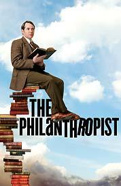The Philanthropist's Steven Weber Clicks His Heels and Comes Home
About the author:
Steven Weber, a familiar face thanks to high-profile roles on the airport sitcom Wings and critically acclaimed Studio 60 on the Sunset Strip (plus a notable arc on Brothers & Sisters as Rachel Griffiths' lover), is a real-deal New Yorker. Born and raised in Queens, he attended Manhattan’s High School of Performing Arts and is currently making his fifth appearance on Broadway as Matthew Broderick’s underachieving best friend in the academia comedy The Philanthropist. (He previously followed Broderick as Leo Bloom in The Producers.) Despite this enviable Big Apple pedigree, Weber hasn’t always been in a New York state of mind. In fact, he admits to a furtive dislike of the city so intense that it literally drove him across the country. But even after years of living the L.A. dream as he successfully broke into film and TV and met wife Juliette, the tie between Weber and his hometown couldn’t be broken. In a personal essay oozing with New York cool, Weber explains why he abandoned the city that never sleeps and what ultimately brought him back home. ![]()
I have a confession to make: I hated New York City for years.
Yep. Despised it. It wasn't the result of a violent quarrel. The six or seven times I had been mugged as a pimply teenager hadn't done it. The occasionally jaw-dropping lack of civility in a sweltering, jammed subway car in a summer hadn't, either. It just kinda happened.
Sacrilege, I know. I had attended the High School of Performing Arts back when it was on 46th between Sixth and Seventh Avenues, and while that was exciting, I felt as though I was on an oasis which I dare not set foot off. Maybe it was just childish rebellion to want to escape from under its parent's (in this case, sweaty and grimy) wing.
But after a while I just couldn't find any of the classic New York charm so gorgeously rhapsodized by E. B. White or Pete Hamill. Instead, I was assaulted daily by what seemed like the continual and relentless wafting of sour smells; the molar-loosening noise of metal against metal and/or metal against asphalt; the soul-compressing feeling of traversing what felt like the viscous floor of a great, harshly reflecting glass canyon. I felt hemmed in and burnt out. I cynically referred to the city as The Big Ashtray. My mother (a Bronx native, now a happy East Sider) was aghast. Friends thought I was trying on "being contrary" for size. But no: I had just fallen out of love.
In the old days, when a man lost the love of his life, he joined the Foreign Legion. I did the modern equivalent: I went to L.A.
Things are nice there. I found relative peace, the serenity of disengagement. I found a place to hang my hat. I found love and family. I found gainful employment. I found things that I consciously and subconsciously hungered for all those years growing up alternately terrified and enthralled in Gotham. It was, in a word, okay.
And then 9/11.
I received a call from my mom—heard it, actually, on my answering machine: "Are you up? Are you watching what's happening? I'm all right..." I got up and turned on the TV.
Two weeks later I glimpsed the jagged, mortally altered skyline as I flew into JFK. That evening I walked downtown and saw the still smoldering ruins, felt and smelled the warm, acrid breeze, caught the eyes of the people who had lived through it, who had never left the city and who never would.
I came face to face with the city that had reared me in its rough, often crude way, and now I felt like it needed all its children to come home, to give back all that it had given, all that I had in my callowness misunderstood. Like The Giving Tree, the city had given so much of itself, grouchily at times, to the spoiled child I had been but had now discarded, having gained an understanding of what was really precious about this city.
I live in Tribeca now, steps from where the World Trade Center fell. I am lucky enough to be acting in a play on Broadway (The Philanthropist; come and see it!). I am inhaling, luxuriating, loving again the city as it continues to recuperate, to regenerate, to re-emerge. And now I see this city as it has, in fact, always been: still gruff, still throbbing, still challenging and now through my opened eyes and heart, still utterly splendid. I want to be a part of that now. I want to come home. And New York, true to form, is letting me.
